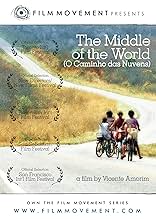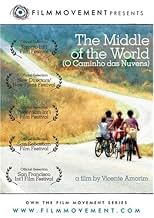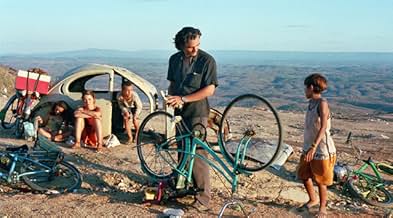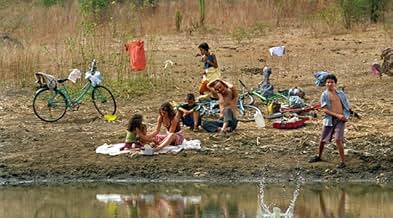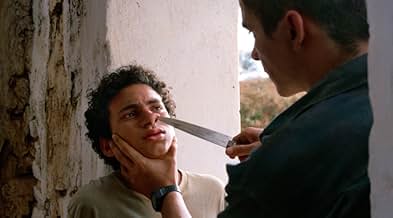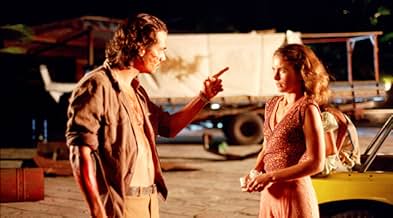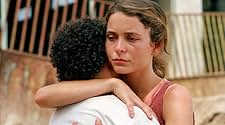IMDb रेटिंग
6.5/10
1.3 हज़ार
आपकी रेटिंग
अपनी भाषा में प्लॉट जोड़ेंA man and his family travel 3200km (1984 miles) by bicycle, from the State of Paraíba to Rio de Janeiro, Brazil, in search of a job.A man and his family travel 3200km (1984 miles) by bicycle, from the State of Paraíba to Rio de Janeiro, Brazil, in search of a job.A man and his family travel 3200km (1984 miles) by bicycle, from the State of Paraíba to Rio de Janeiro, Brazil, in search of a job.
- पुरस्कार
- 1 जीत और कुल 9 नामांकन
Manoel Sebastião Alves Filho
- Rodney
- (as Manoel Sebastião)
Felipe Newton Silva Rodrigues
- Clévis
- (as Felipe Newton)
Cícera Cristina Almino de Lima
- Suelena
- (as Cristina de Lima)
Cícero Wesley A. Ferreira
- Cícero
- (as Cicero Wallyson e Ciceero Wesley)
Alexandre Zacchia
- Porfirio
- (as Alexandre Zachia)
फ़ीचर्ड समीक्षाएं
A great Brazilian movie called "The Middle of the World", which, in fact, it is in so many ways. It is a rich but unpretentious chronicle of an extraordinary journey of one rural Brazilian family. The father is illiterate and unable to find work. Romão (the father), Rose(the mother), and their five children, from a teen to a baby, begin to make a journey on bicycles and head for Rio de Janeiro, which is 2,000 miles away, to find work. They face all kinds of physical and emotional hardships along the way, seeing many kinds of villages, dirt roads and superhighways, and desolate to spell binding scenes of nature. They beg, do odd jobs, sing in outdoor cafés for money, scrounge around in old abandoned homes, swelter under the blazing sun, almost die of thirst, and sleep under the stars; yet all the while, they keep trying to survive and maintain their love for each other, which is often tested beyond limits. The husband and wife relationship has classic features that are displayed poignantly and expertly. They exhibit a kind of yin and yang pattern with Romão being a strong, soft spoken, intensely patient, idealistic optimist and Rose being the one who verbalizes their feelings of love, sympathy, joy, as well as despair, fear, and anguish. She is also outspoken when their frailties have been overtaxed and when there is a need to be practical. Her pragmatism and his religious convictions balance each other out. Nevertheless, they are able to switch roles as the one to comfort, encourage, or recommit to the challenge when either has had enough and is losing hope and faith in their vision. With no competition from age-group peers, the character of their parents seems to be emulated as role models by the children. As a sub-plot, the teenager, Antonio, is in the middle of growing into manhood. The Father, Romão, exercises patient parental control through mild rebukes and testing Antonio's mettle by letting him use his judgment and make mistakes, but he also subtly guides him with silent looks of acknowledgement that builds Antonio's confidence in himself. Rose, the mother, gives equal guidance by emphasizing caution and protectiveness but also gives him a sense of profound mother-love that becomes his foundation of security. When the father senses Antonio is ready to emancipate, the mother does not want to let go and the father, in his wisdom-love, states simply and firmly to Rose, "We do not own our children." When Antonio is left behind to follow an occupation, the strong and positive family dynamic continues to the end of their journey. Finally, when at their destination of Rio de Janeiro, and expressing the powerful spirit of this family, their triumph is symbolized in a mountain top experience as they stand together viewing Corcovado's Statue of the Christ and overlook the prize of their victory, the city of their dreams. As they crossed the 2,000 miles of their courageous journey, they witnessed the many ways in which the nation they once knew is rapidly changing. It was a raw, earthy, beautiful story. It gave such a realistic picture of Brazil as a whole. It is a beautiful country but also has such vast differences between the rich and poor. The movie also showed what a big and truly dominant role religion, and religious superstitions, plays in the lives of the poor, illiterate 'peasants'. At 'The Middle of the World', two different worlds, the new cosmopolitan and the old world, stand on the same piece of earth!
This is the (based on a true) story of a peasant family from northwest Brazil that migrates to Rio. They travel not how people usually do it, but as a family, on bicycles. Five children, mom and Dad, on five bicycles. Six months it takes them, and 3000 kilometers.
It's a wonderful premise for a movie, and I was disposed to like it. I've liked other films about NE Brazil. Vidas Secas by Nelson Pereira dos Santos; Me, You, Them by Andrucha Waddington; Central Station by Walter Salles. I'd like to take another look at the Glauber Rocha films if they ever become available.
But this well intentioned film just didn't make it for me. The actors were too pretty, too handsome, their teeth too perfect and white, their bodies conditioned in a gym, their faces unburnt by a lifetime in the sun. They were too clearly actors in a created scene that was too foreign to them. They just failed to meaningfully embody their characters. It felt like they were following a recipe for acting: recite lines, add so much of this or that emotion, make meaningful glances, and voila, soufflé.
In general, the "acted" scenes filmed in a studio didn't' feel right. They felt more like a mediocre made-for-TV telenovela.
The filmmakers missed the real grit of the sturm und drang of surviving on the road by your wits and your faith. Very few close-ups. The bicycles, for example: we never saw a greasy hand or a wrench or a spoke. The rich texture of the side of the road was strangely missing, such as the people who make huge pots of tripe and rice and beans and sell it to the truck drivers, half the price of restaurant food.
But the gravest mistake was the filmmakers attempt to make the picaresque, true story of a migration/pilgrimage fit into ready-made story lines, including one especially lame subplot about the coming-of-age of the oldest boy, Antonio, his conflict with the father. The eventual resolution of the conflict between father and son was downright bathetic. Saccharin-sweet sentimentality.
The scenes of Brazil were great. The roads, the berm, the sand, the daub and wattle, the life-beside-the-flow of the river/road, the landscape, the cactus, the hot dreamy little towns and villages with their brick streets and bright colors. But still, a little too pretty. I know the scene. I lived in rural northwest Brazil for 4 years and did 80,000 kilometers of traveling in Bahia. I lived in Feira de Santana for a few months, and that city is part of the movie. I love that part of the country and its people. I liked the scenes of Juazeiro.
One scene that totally failed for me was the whole "Panama" episode. It felt like it was written into the script.
The script as a whole was predictable. The attempts at character development seemed to come from the writing. Each time our travelers learn a new lesson, the filmmakers make them stand up and announce it.
The film would have worked better in documentary style, like say Slumdog Millionaire. Imagine if the filmmakers had paused a little more to explore the details of the roadside in northeast Brazil?
It's a wonderful premise for a movie, and I was disposed to like it. I've liked other films about NE Brazil. Vidas Secas by Nelson Pereira dos Santos; Me, You, Them by Andrucha Waddington; Central Station by Walter Salles. I'd like to take another look at the Glauber Rocha films if they ever become available.
But this well intentioned film just didn't make it for me. The actors were too pretty, too handsome, their teeth too perfect and white, their bodies conditioned in a gym, their faces unburnt by a lifetime in the sun. They were too clearly actors in a created scene that was too foreign to them. They just failed to meaningfully embody their characters. It felt like they were following a recipe for acting: recite lines, add so much of this or that emotion, make meaningful glances, and voila, soufflé.
In general, the "acted" scenes filmed in a studio didn't' feel right. They felt more like a mediocre made-for-TV telenovela.
The filmmakers missed the real grit of the sturm und drang of surviving on the road by your wits and your faith. Very few close-ups. The bicycles, for example: we never saw a greasy hand or a wrench or a spoke. The rich texture of the side of the road was strangely missing, such as the people who make huge pots of tripe and rice and beans and sell it to the truck drivers, half the price of restaurant food.
But the gravest mistake was the filmmakers attempt to make the picaresque, true story of a migration/pilgrimage fit into ready-made story lines, including one especially lame subplot about the coming-of-age of the oldest boy, Antonio, his conflict with the father. The eventual resolution of the conflict between father and son was downright bathetic. Saccharin-sweet sentimentality.
The scenes of Brazil were great. The roads, the berm, the sand, the daub and wattle, the life-beside-the-flow of the river/road, the landscape, the cactus, the hot dreamy little towns and villages with their brick streets and bright colors. But still, a little too pretty. I know the scene. I lived in rural northwest Brazil for 4 years and did 80,000 kilometers of traveling in Bahia. I lived in Feira de Santana for a few months, and that city is part of the movie. I love that part of the country and its people. I liked the scenes of Juazeiro.
One scene that totally failed for me was the whole "Panama" episode. It felt like it was written into the script.
The script as a whole was predictable. The attempts at character development seemed to come from the writing. Each time our travelers learn a new lesson, the filmmakers make them stand up and announce it.
The film would have worked better in documentary style, like say Slumdog Millionaire. Imagine if the filmmakers had paused a little more to explore the details of the roadside in northeast Brazil?
May be the summary say it all but the movie it's so great that I'm gonna give interested people more info about it. Is the first time in the latinamerican movie history when a director make a movie about being poor is not a terrible drama, it's just life, nothing more and nothing less. You can watch how is it the Latin American way to live the poverty: It's a daily drama that everybody lives each day of their life and that make's life less dramatic. In the movie you can found a typical family and the play of each character are the same in every place in the world without differences of social class. In the film you can make a road-trip from the north to the south of Brazil but without the typical beach and sun scenery. No, here it is another part of Brazil, that part where the real people live and tourism don't show. Incredible characters and fantastic places.
Part "Road Movie" and part "Coming-of-Age" film, "O Caminho Das Nuvens" is an enjoyable little Brazilian flick that tells us the story of Ramao, his wife Rose, and their 5 children, as they make their way from "The Middle of the World" in Paraíba to Rio de Janeiro, on bikes, in search of work and a place to settle down.
Shot in Neorealist tradition- similar to film's like De Sica's "Bicycle Thief"- we are not shown the beginning of the family's journey, nor it's conclusion...but, rather, are offered a privileged glimpse into a "slice of (this poor family's) life".
The characters are real/regular people, and as such, could represent any one of the countless number of families' that have made similar journeys from rural Brazil to major urban centers like Rio and Sao Paolo, in search of new oppourtunities and a "better life".
From the start, we are privy to the fact that the family has no set destination, little direction, and even less money to survive on. It seems that Ramao has dragged his family on this epic excursion based on a whim, and a slightly psychopathic desire to find a job that pays "1000 reisas a month"- which he feels he will need in order to take care of his large family.
We follow Ramao and his family and observe the trials and tribulations that they must endure during the six month exodus they have embarked on...
To get by the family relies on the generosity of others...begging, panhandling, busking and doing odd jobs that will earn them enough cash to keep food in their bellies. Ramao acts quite callously toward his family, for a man that relies on them for money and survival. These feelings of inadequacy are likely a consequence of his inability to provide for his family.
Tension starts to develop between Ramao, his wife, and their eldest son Antonio, as Ramao repeatedly refuses job oppourtunities that do not meet his moral or monetary expectations. This is exacerbated when he decides to extend their journey, despite pleas from his tired and hungry family.
As Ramao comes to grips with the fact that his dreams and expectations are, in all likelihood, not going to be realized, the film begins to focus on the relationship with his teenage son Antonio.
At the beginning of the film, Ramao treats Antonio like he is an unwanted burden- constantly putting him down- though it seems the family wouldn't be as safe without him. We watch as Antonio becomes more independent; getting his coming-of-age experiences at various stops made by the family along the way. By the second half of the film it becomes clear that, despite their somewhat tenuous relationship, Ramao has been trying to get Antonio ready for life on his own.
As the family nears their next (final?) destination, the film goes out on an emotional note....though we never do find out what fate has in store for them. I guess this is a comment on, "life being about the journey, not the destination".
"The Middle of the World" is a simple, heartwarming film about a family on a journey. The locations and cinematography are beautiful and the acting is pretty good. It's also worth mentioning that the actor playing Ramao (Wagner Moura) looks a helluva lot like Johnny Depp!!! Definitely worth a watch, 6.5 out of 10.
Shot in Neorealist tradition- similar to film's like De Sica's "Bicycle Thief"- we are not shown the beginning of the family's journey, nor it's conclusion...but, rather, are offered a privileged glimpse into a "slice of (this poor family's) life".
The characters are real/regular people, and as such, could represent any one of the countless number of families' that have made similar journeys from rural Brazil to major urban centers like Rio and Sao Paolo, in search of new oppourtunities and a "better life".
From the start, we are privy to the fact that the family has no set destination, little direction, and even less money to survive on. It seems that Ramao has dragged his family on this epic excursion based on a whim, and a slightly psychopathic desire to find a job that pays "1000 reisas a month"- which he feels he will need in order to take care of his large family.
We follow Ramao and his family and observe the trials and tribulations that they must endure during the six month exodus they have embarked on...
To get by the family relies on the generosity of others...begging, panhandling, busking and doing odd jobs that will earn them enough cash to keep food in their bellies. Ramao acts quite callously toward his family, for a man that relies on them for money and survival. These feelings of inadequacy are likely a consequence of his inability to provide for his family.
Tension starts to develop between Ramao, his wife, and their eldest son Antonio, as Ramao repeatedly refuses job oppourtunities that do not meet his moral or monetary expectations. This is exacerbated when he decides to extend their journey, despite pleas from his tired and hungry family.
As Ramao comes to grips with the fact that his dreams and expectations are, in all likelihood, not going to be realized, the film begins to focus on the relationship with his teenage son Antonio.
At the beginning of the film, Ramao treats Antonio like he is an unwanted burden- constantly putting him down- though it seems the family wouldn't be as safe without him. We watch as Antonio becomes more independent; getting his coming-of-age experiences at various stops made by the family along the way. By the second half of the film it becomes clear that, despite their somewhat tenuous relationship, Ramao has been trying to get Antonio ready for life on his own.
As the family nears their next (final?) destination, the film goes out on an emotional note....though we never do find out what fate has in store for them. I guess this is a comment on, "life being about the journey, not the destination".
"The Middle of the World" is a simple, heartwarming film about a family on a journey. The locations and cinematography are beautiful and the acting is pretty good. It's also worth mentioning that the actor playing Ramao (Wagner Moura) looks a helluva lot like Johnny Depp!!! Definitely worth a watch, 6.5 out of 10.
10kridas
it's the best road movie after Thelma and Louise. It's lovely in tempo, pictures, acting performance even of the very small kids, nice music, good mixture of action, drama, laughter, hope and despair, and getting out of your life the best possible....
क्या आपको पता है
- ट्रिवियाCarol Castro's debut.
- कनेक्शनReferenced in A Dona da História (2004)
टॉप पसंद
रेटिंग देने के लिए साइन-इन करें और वैयक्तिकृत सुझावों के लिए वॉचलिस्ट करें
विवरण
- रिलीज़ की तारीख़
- कंट्री ऑफ़ ओरिजिन
- आधिकारिक साइट
- भाषाएं
- इस रूप में भी जाना जाता है
- The Middle of the World
- फ़िल्माने की जगहें
- उत्पादन कंपनियां
- IMDbPro पर और कंपनी क्रेडिट देखें
बॉक्स ऑफ़िस
- दुनिया भर में सकल
- $13,278
- चलने की अवधि1 घंटा 25 मिनट
- रंग
- ध्वनि मिश्रण
- पक्ष अनुपात
- 1.66 : 1
इस पेज में योगदान दें
किसी बदलाव का सुझाव दें या अनुपलब्ध कॉन्टेंट जोड़ें



